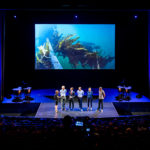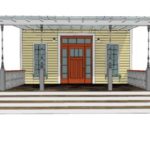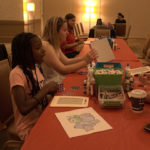
If you’ve ever wondered whether you’re really doing any good when you drop a bunch of attendees into a community-service project for a few hours — Ken Budd thinks you most certainly are. He would know. Over the course of about three years, he participated in six service projects all over the world, starting in New Orleans, where he helped clean up and restore houses after Hurricane Katrina, and ending in Kenya, where he and his wife volunteered at a home for orphans. He wrote about his experiences in a book that came out last year called The Voluntourist: A Six-Country Tale of Love, Loss, Fatherhood, and Singing Bon Jovi in Bethlehem.
“There is a lot of debate about voluntourism itself,” Budd said over lunch recently in downtown Washington, D.C., at a restaurant not far from the office where he works as a magazine editor. “Does it cause more harm than good? That debate usually focuses on orphanages in Third World countries. I really came to feel like the gesture itself was meaningful, especially to those who were on the other end of it.
“And it often gets you thinking in ways you wouldn’t have. You wind up finding out a little bit more about a place than if you’d just stayed in the hotel or at the convention. I always talk about the ‘tourist cocoon.’ Anything that gets you out of that cocoon is a good thing, even if it doesn’t necessarily feel big. I saw again and again that even just the smallest little things can be meaningful.”
Life After Death
Budd’s journey outside the cocoon began in the summer of 2005, when his father died of a heart attack while he was playing golf near his home in northern Virginia. He was 65, and had been retired for a year. Budd was just shy of 40, and between that milestone, his father’s sudden death, and the dawning realization that he and his wife weren’t going to have children, he felt lost. Like his life lacked meaning. Like he needed to make a difference, just like his old man, an executive for a Japanese-owned manufacturer.
“After he died, we started getting these letters from people who worked with him, saying, ‘Well, your father changed my life,’” Budd said. “So you read these letters and you’re thinking, what are people going to say when it’s my turn? … What can you do to help others in some small way? How is that part of your legacy?”
The Voluntourist, funny and touching, details Budd’s efforts to answer those questions. He went to New Orleans by himself in May 2006, and to Costa Rica with his wife three months later to teach English in a poor village. He thought that got the voluntourism bug out of his system — “It wasn’t like after the first one I thought, I’ll do volunteer work to spread happy fairy dust,” Budd said — but a few years later, he writes, “I was still pondering my purpose, still feeling irrelevant,” and after much soul-searching he realized that he needed to do more.
In May 2009 he found himself in Xi’an, China, along with his brother-in-law, working in a school for special-needs children. That September he went to Ecuador to volunteer with a research team tracking climate change in the ecosystem of the Santa Lucía Cloud Forest Reserve. Christmas saw him in the West Bank — in Bethlehem, helping out at a Palestinian refugee camp. And in January 2010, he and his wife went to Kiembeni, Kenya, to volunteer at Calvary Zion, a home for 40 abandoned or orphaned children ranging from seven months to 18 years old. For all six trips, he worked with established organizations that specifically run voluntourism programs.
What Do You Care?
Budd hasn’t done any voluntouring since, but instead devotes his efforts to supporting the six projects in which he participated, including donating any money from The Voluntourist to them. But how about the people and the places he left behind? And how about you and your own CSR projects, which typically aren’t nearly as long or cross-cultural or immersive as Budd’s experiences? Are they actually helping anyone? Budd has some thoughts about that.
Everything helps After five days of scraping paint, sweeping up trash, and doing other unskilled labor among the flood-wrecked houses in New Orleans’ Ninth Ward, Budd was under no illusions that he and his fellow volunteers had made a huge difference. But they had made a little difference. “If someone doesn’t scrape, the house doesn’t get painted,” Budd writes in The Voluntourist. “If the house doesn’t get painted, the house doesn’t get finished. If the house doesn’t get finished, the owner doesn’t move back in. If the owner doesn’t move back in, he or she is still homeless.”
The Intangibles Matter
“China is an example,” Budd said in our interview. “I was primarily paired with one little boy, but I always thought that the most important thing that we did was, these teachers work incredibly difficult jobs, and my friend and I were there and we were like a novelty to them. They would try out their English, and when I did something stupid they would laugh. I heard that after we left one of them said, ‘You know, we seem to laugh more when we have volunteers here.’ That’s not something you think of as part of your mission when you go.”
Don’t forget the tourism part It’s called voluntourism — meaning you’re not just there to volunteer, you’re there to meet people and see things and, frankly, to spend money. In his chapter about New Orleans, Budd writes about the “grateful reaction throughout the city. The hotel staff seemed so damned happy when I arrived. Not the phony, robotic ‘How may I help you’ happy you normally receive. This was thankyou, thank you, we need people to visit our city, please tell your friends. The doorman’s smile made me feel like a long-lost brother.”
Who knows where it might lead you? Three years after his last trip, Budd is still in touch with people he met at each of the places he volunteered, and plans on continuing to try to help them “for the foreseeable future,” he said. “That is the other thing…. You just don’t know what’s going to spark out of that one little act you do. Painting that place when you were just there for a convention could lead you to do something down the road that you never would have thought about if that spark hadn’t occurred there.”
Another Thing About CSR
“It was somebody in Costa Rica, a British volunteer, who told me that you only know yourself when you’re outside of your comfort zone,” Ken Budd said. “After that, I really came to embrace it. I really wanted to go to places that intimidate me a little bit or to do things that I’ve never done.
“That’s the great thing about travel. Travel can pull you out of the familiar and force you to see yourself differently. These kinds of trips lend themselves to that, because you immerse yourself in culture in a way you don’t otherwise. I don’t think that anyone who’s gone through a personal crisis said,’ You know, I’m questioning things. I have to go to Disney World.’”



